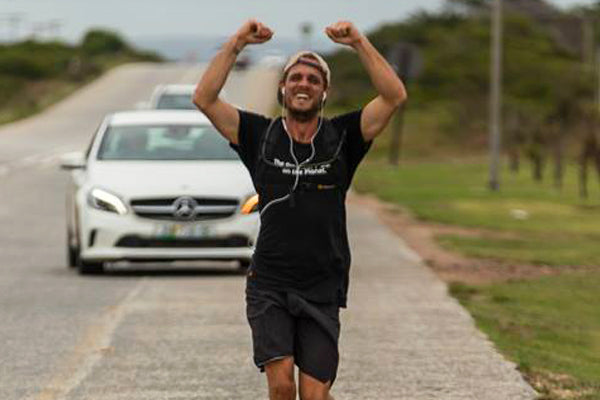The Greenest Tee - Women size chart

The sight of tens of thousands of runners pouring through city streets has become a familiar scene all over the world. Iconic bridges, major tourist attractions and arterial roads are closed to regular traffic for a rare chance to pound the cobblestones or climb ancient steps. No question this trend is positive in many ways - fitness becomes a focus, tourism booms, local shops and restaurants enjoy peak crowds.
And like everything, there’s also a flip side. The impact to the local environment is both direct and indirect - and it can be a problem. Big crowds of athletes and spectators leave behind significant piles of litter. Tens of thousands of plastic cups, empty gel packets, used water sponges. Participants are often given a finisher medal, and in all seriousness, once you’ve completed a few of these events, those tinny souvenirs sure do pile up gathering dust.
But perhaps the biggest mistake many event companies make is to provide a poor quality (but free) finishers’ shirt. Like many of my fellow athletes, I have a drawer in my wardrobe crammed with mass produced, ill-fitting and decidedly unstylish Finisher tees. They’re typically made from uncomfortable polyester which is not pleasant to run in, and being a synthetic fabric is very unfriendly to the planet. Even the cotton finisher tees have a negative impact, cotton being one of the thirstiest and insect-sprayed crops around. Not many people are aware that a regular cotton t-shirt can use 3,000 litres of water to produce.
Think of the numbers here - just with major marathons around the world - let’s take the big five - London, New York, Tokyo, Paris & Boston as an example. Roughly 200,000 runners will take part in just those five races every year. That’s 200,000 finisher shirts that have to be manufactured and probably never worn at the expense of the planet.
The other day as I ran my regular loop across the Sydney Harbour Bridge, I noticed the guy in front of me wearing a marathon tee from a well known global finance company. It proudly shouted 265,000 runners, 13 cities, 2014 (or similar, I didn’t have my phone with me to take a pic). I wonder if that company really thought through the impact those event shirts might have. Are they well made from a quality, sustainable fabric? Are they an item of clothing all those runners will wear time and time again, until worn through? Maybe they’re ok - maybe this particular runner in front of me is the norm not the exception and those 265,000 runners in 13 cities are wearing their run shirts whenever they train. It’s possible, but I doubt it.
It’s refreshing to see some sports event companies are starting to put the environment further up the priority list. Endurance Evergreen for example in Europe has a planet friendly approach - their mantra is hammer the race, leave no trace. This is a great example of the future of sports events - positive environmental impact, making athletes, spectators, sponsors and organisers all responsible for leaving the location as beautiful as it was before the event. There is a tremendous opportunity going begging for event companies to get on the environmental front foot. Review supply chains, double check customer wants and needs, create quality event souvenirs and if needed make a change. Work with sustainable companies that push for positive environmental impact - there is no shortage of them. Tick the Corporate Social Responsibility box and maybe even qualify for funding based on your new approach.
And for all of us - we should be asking the right questions. Of the event organisers, what’s the environmental impact of the race? How green is your event? And of yourself - what’s the impact you personally leave behind as you collect your swag and pull on that finisher tee?







Graham Ross
Author
Graham Ross is CEO of Kusaga Athletic and growth advisor to planet friendly companies. Graham is a multiple Ironman-distance triathlete and marathoner with a passion for riding up the biggest mountains he can find.